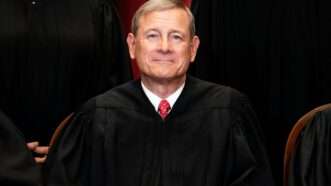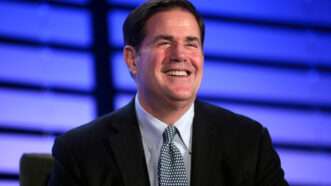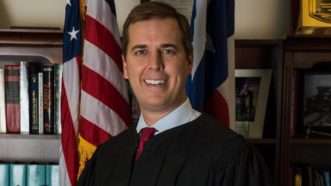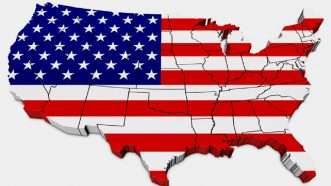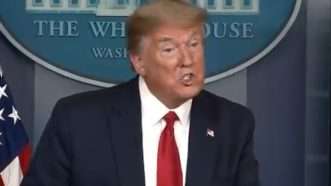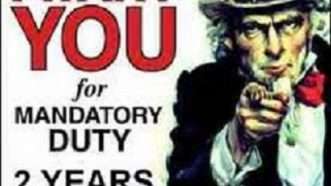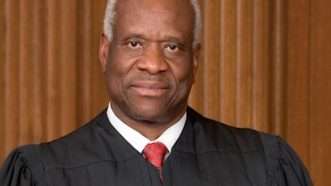Commerce Clause
A Federal Judge Lets a Cruise Line Require Proof of Vaccination, Saying a Florida Law Banning the Practice Is Probably Unconstitutional
Gov. Ron DeSantis' embrace of the law contradicts his avowed commitment to economic freedom.
For the Third Time, the Roberts Court Rescues Obamacare
Without a mandate penalty, the challengers had no standing.
Federal Regulators Require Rent Collectors To Lie About the CDC's Illegal Eviction Moratorium
The Consumer Financial Protection Bureau claims to be enforcing a law that prohibits "false or misleading representations."
The CDC vs. the Constitution
The Founders could not have possibly imagined the Commerce Clause covering an eviction moratorium.
COVID-19 Edicts Highlight the Importance of Structural Limits on Government Power
The national eviction moratorium and Arizona’s business restrictions were based on dubious assertions of authority.
The State of the Legal Struggle Over the CDC Eviction Moratorium
Two district court decisions have upheld the moratorium against various challenges, while one has ruled against it. The legal battle may be just beginning.
Federal Court Strikes Down CDC's Controversial Eviction Ban as Unconstitutional
A nationwide ban on evictions is well outside the congressional power to regulate interstate commerce, ruled U.S. District Judge J. Campbell Barker on Thursday.
Democratic Warnings That Confirming Amy Coney Barrett Would Doom Obamacare Are Implausible and Confused
There is little reason to think Barrett would vote to overturn the Affordable Care Act, which in any case seems legally secure.
Supreme Court Justices in Texas and Pennsylvania Emphasize That COVID-19 Lockdowns Require Judicial Scrutiny
Not everything that states do in the name of protecting public health is consistent with the Constitution.
My New USA Today Op Ed on Coronavirus and Federalism
The article explains why the coronavirus crisis does not justify weakening constitutional limits on federal government power.
Trump Can Encourage States to Lift Their COVID-19 Lockdowns, but He Can't Decree That Outcome
The president has a history of asserting powers he does not actually have.
Restrictions on Interstate (and Intrastate) Travel in an Epidemic
are generally constitutional (whether they forbid travel to a particular place, or require travelers to be temporarily quarantined).
Would a Ban on Handshaking Be Constitutional?
Not that I'm suggesting it, but it's an interesting con law hypo.
Now That It's Toothless, Obamacare's Individual Mandate Is Unconstitutional
The shifting understanding of the requirement to buy health insurance elevates form above substance.
Are California's New Data Privacy Controls Even Legal?
A new paper raises constitutional questions about expansive state-level regulations that reach beyond their borders.
Puppies and Kittens Trump the Constitution
The new federal ban on animal cruelty converts the Commerce Clause into a general police power.
Congress Tortures the Constitution To Obtain Permission for a Federal Animal Cruelty Law
Where does Congress get the authority to redundantly criminalize abuse of mammals, birds, amphibians, and reptiles?
NFIB v. Sebelius Already Addressed the "Injury in Fact" Question in Texas v. U.S.
An important element of standing has already been decided by the Court
Texas v. U.S.: Why the Individual Mandate is Still Unconstitutional
Understanding NFIB v. Sebelius
Appellate Court Upholds Constitutionality of Federal Hate Crimes Act Conviction Based on the Commerce Clause
The decision is a complicated ruling that potentially sets a dangerous precedent for the scope of federal power under the Constitution.
Justice Department Decides Not to Appeal Court Ruling Striking Down Federal Law Banning Female Genital Mutilation
The decision is likely to be unpopular. But it is the right thing to do nonetheless, as the law is unconstitutional. Not every evil must be addressed by a federal law.
Is the 21st Amendment a Free Pass for Liquor Protectionism?
Tennessee alcohol merchants are asking the Supreme Court to uphold an absurd residency requirement that shields them from competition.
The Next Attorney General Says He Won't Go After State-Licensed Marijuana Suppliers
William Barr does not like legalization but says Congress has to resolve the "untenable" conflict between state and federal law.
Does a State Law That Bars Newcomers From Selling Liquor Violate Their 'Privileges or Immunities'?
In a case SCOTUS will hear next month, victims of Tennessee's protectionism argue that it flouts the 14th Amendment as well as the Commerce Clause.
The 5 Worst Supreme Court Rulings of the Past 50 Years
Cases in which a majority of the Court fell down on the job.
Why Mandatory National Service is Both Unjust and Unconstitutional
A post based on my presentation at a panel on mandatory national service organized by the National Commission on Military, National, and Public Service.
Abortion, Clarence Thomas, and the Commerce Clause
Cornell law professor Michael Dorf asks whether Clarence Thomas would vote to strike down federal laws restricting abortion, on federalism grounds. The answer might well be yes. But the issue would have to be presented to him in the right way.
SCOTUS Feigns Federalism in Sports Betting Decision
Congress can't "commandeer" state legislators, but it can achieve the same result with "preemption."
The 'Protect and Serve Act' Is both Unnecessary and an Assault on Federalism
There is no justification for a proposed law that would make attacks on police officers a federal crime.
Jeff Sessions Escalates the Federal War on Marijuana - and his Assault on Federalism
The attorney general's reversal of an Obama policy limiting prosecution of marijuana businesses in states that have legalized marijuana is a limited, but potentially dangerous step.
States Partner to Sue Massachusetts, California Over Costly Livestock Bans
Two states attempt to dictate how farmers outside their boundaries treat their animals.
These Three Cases Define This Month at the Supreme Court Term: Podcast
How to think about gay wedding cakes, Fourth Amendment rights, and whether the federal government can ban sports betting. Plus: How will Neil Gorsuch vote?
Does the Commerce Clause Empower Congress to Regulate Every Living Thing?
A potential Supreme Court case challenges federal protection of an intrastate species with no commercial value.
Maine Food Sovereignty Bends but Doesn't Break After USDA Threats
Law amended to make sure meat processors comply with federal regulations.
The Ninth Circuit's Foie Gras Blunder
A federal appeals court raises California's unconstitutional ban from the dead.
D.C. Threatens to Punish Manufacturers for Failing 'Flushability' Standards It Won't Define
The 'Do Not Flush' fight provides a perfect case study in arbitrary regulation and government incompetence.
Unconstitutional State Food, Agriculture Crackdowns Spur Congress to Act
States like Massachusetts attempt to control how farms outside their borders operate.
America 'Not the World's Lawgiver,' Justice Thomas Protests in 'Dracula' Sex-Trafficking Case
Can U.S. courts compel non-citizens to pay restitution to other non-citizens for crimes that took place abroad? Apparently so.
The Marijuana Exception to Federalism
If Jeff Sessions tries to shut down state-licensed cannabusinesses, he will betray his own principles.
Don't Look Now, But Michigan's Restricting Wine Shipments Again
Michigan lawmakers and the Twenty-First Amendment stink.
Can Egg Producers Recover from November's Great Fall?
Large farms have been stung by two recent setbacks. What's next?
Unless a Federal Court Acts Fast, Vermont's GMO Labeling Law Will Wreak Havoc on the Nation's Food Supply Next Week
It's set to take effect next week and will cost food companies for no good reason.
Facebook's Trending Section Is Now the Business of US Senate Commerce Committee
Sen. John Thune (R-S.D.) wants answers from Mark Zuckerberg and company over allegations of political bias in curated news feed.
Anti-Pot Oklahoma Legislator Celebrates the Death of His State's Anti-Pot Lawsuit
Where other conservatives see cannabis chaos, Mike Ritze sees a victory for federalism.
The Perils of Merrick Garland's Moderation
The Supreme Court nominee's deference to government should disturb progressives as well as conservatives.
Nosy Neighbors Tell Colorado to Stop Regulating Pot
Oklahoma and Nebraska say legal marijuana is like state-authorized pollution.
How Do You Like Greg Abbott's New, Improved Constitution?
The Texas governor suggests nine amendments "to restore the rule of law."


